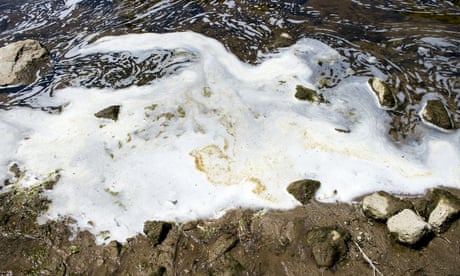- by foxnews
- 08 Apr 2025
‘Toxic trail of pollution’: states step up to curb the use of ‘forever chemicals’
‘Toxic trail of pollution’: states step up to curb the use of ‘forever chemicals’
- by theguardian
- 06 May 2023
- in politics

Few chemicals have attracted as intense public and regulatory scrutiny as PFAS, but even as the highly toxic and ubiquitous compounds' dangers come into sharper focus, industry influence has crippled congressional attempts to pass meaningful consumer protections.
Federal bills designed to address some of the most significant sources of exposure - food packaging, cosmetics, personal care products, clothing, textiles, cookware and firefighting foam - have all failed in recent sessions.
However, a patchwork of state laws enacted over the last three years is generating fresh hope by prohibiting the use of PFAS in those and other uses. These laws - mostly passed in Democratic-controlled states - are quietly forcing many companies to phase out the chemicals as they become illegal to use in consumer goods in some of the nation's largest economies.
"We've seen some corporate leadership on PFAS, but the actual state policies that say 'No, you have to do this' - those are great incentivizers," said Sarah Doll, director of Safer States, which advocates for and tracks restrictions on toxic chemicals at the state level.
PFAS are a class of about 15,000 chemicals often used to make thousands of consumer products across dozens of industries resist water, stains and heat. The chemicals are ubiquitous, and linked at low levels of exposure to cancer, thyroid disease, kidney dysfunction, birth defects, autoimmune disease and other serious health problems.
Though the Biden administration is devoting significant resources to limiting and cleaning up environmental PFAS pollution, it has no coherent strategy to address the chemicals' use in consumer goods, and states have filled that void. Among those are laws banning their use in:
Maine has gone several steps further with a ban on all non-essential uses of PFAS, and the momentum continues this session in 33 states where legislation has been introduced. Vermont's senate unanimously approved a ban on the chemicals in cosmetics, textiles and artificial turf.
The state policies may make it financially and logistically impractical for many companies to continue using PFAS, and their effects could reverberate across the economy.
"It would not make sense to not use the cancer-causing chemical in California and New York, but go ahead and use it in Texas," said Liz Hitchcock, federal policy director at Toxic-Free Future, which advocates for stronger restrictions on chemicals.
Among a cascade of companies moving away from the compounds in some or all products are Patagonia, Victoria's Secret, Target, Home Depot, Lowe's, Ralph Lauren, Zara, H&M, Abercrombie & Fitch, Calvin Klein, Burberry, Tommy Hilfiger, McDonald's, Burger King, Rite Aid, Amazon, Starbucks, Whole Foods, Taco Bell and Pizza Hut.
Sephora, Revolution Beauty and Target are among those in the cosmetic and personal care sector that have announced phase-outs of PFAS.
In December, 3M, perhaps the world's largest PFAS producer, announced it would discontinue making the chemicals, in part citing "accelerating regulatory trends focused on reducing or eliminating the presence of PFAS".
Companies widely use PFAS despite their myriad risks because they are so effective. The story of outdoor giant REI Co-op is emblematic of industry resistance to phase-outs.
In March 2021, a public health campaign began calling out a glaring inconsistency between REI's virtuous marketing and use of PFAS in waterproof textiles: the company boasted of "responsible production" and advised its customers to "leave no trace" in the wilderness, but sold clothing waterproofed with dangerous PFAS chemicals that the campaign noted left a "toxic trail of pollution".
But that changed in September 2022. California banned PFAS in apparel and textiles, and New York followed soon after. A February REI announcement that it would phase out the chemicals "in part to ensure wide industry alignment with new state laws regarding the use of PFAS" marked a major victory for public health advocates, and a similar story is playing out across the broader marketplace. REI did not respond to a request for comment.
Public pressure is also fueling the development. REI faced "immense pressure" from a coalition of more than 100 NGOs and 150,000 co-op members who signed a petition demanding the company eliminate PFAS in the 18 months ahead of the California apparel ban, said Mike Schade, who spearheaded the effort with Toxic-Free Future's Mind the Store program. Even as REI held out, other companies that Mind the Store approached, like Wendy's and McDonald's, committed to eliminating PFAS.
The interplay among the campaigns, companies committing to eliminating the chemicals and state laws creates a potent "synergy" and sends pressure in both directions, Schade said.
"If we get more companies to act, that builds more political support for action at the state level to regulate and restrict harmful chemicals like PFAS," Schade added. "At the same time, more states acting will create more pressure on businesses to take action ahead of state policies."
California state assembly member Phil Ting's bills to ban the chemicals' use in food packaging and apparel drew surprisingly little resistance from industry, he said, which he ascribed to market momentum. Though most companies, like REI, were still using the chemicals, some major names like Levi's, Whole Foods and McDonald's had already announced phase-outs, the latter two amid pressure from Toxic-Free Future.
"It didn't seem like government was leading, it seemed like government was supporting what had already started happening in the private sector, and that made it much more palatable for my colleagues," Ting said.
Removing the chemicals and identifying, testing and developing safe alternatives for market production is a slow and difficult process that can take years. Before its March announcement, REI had said the "performance that customers expected" could not be matched by alternatives. Still, other companies managed to phase out the chemicals. Levi's eliminated PFAS by 2018, but a spokesperson said the "challenge is significant considering that there are currently no equally effective alternatives to" PFAS.
Moreover, the supply chain is riddled with PFAS entry points as the chemicals are sometimes intentionally or accidentally added to materials upstream. PFAS are also used as lubricants that prevent machines from sticking to materials during the manufacturing process, and previous testing by the Guardian of consumer products highlighted how that can leave low levels of the chemicals on consumer goods.
That can mean that even manufacturers with good intentions may not know their products are contaminated with PFAS, said Christina Ross, a senior scientist with Credo Beauty, a "clean beauty" company. Credo has never intentionally added PFAS to its products and works with suppliers throughout the supply chain to try to avoid adding the chemicals unintentionally. It has found that while some suppliers care about the issue, others do not.
"We try to honor those suppliers who do by giving them our money," Ross said.
But that is ultimately an inefficient and unreliable way for entire sectors to eliminate the chemicals, and Ross said it underscores the need for legislative bans. "In order to remove PFAS from any consumer products we have to stop the chemicals from being made in the first place," she said.
That's unlikely anytime soon at the federal level, where only two out of 50 stand-alone PFAS bills were approved last session, and sources say hyper-partisanship makes passing laws unlikely. States and the US House are passing the measures with bipartisan support, though the laws are largely enacted in Democratic-controlled states.
Observers offer two theories on why. The PFAS issue knows no socioeconomic or political boundaries - PFAS contamination is a problem for everyone, Doll noted, and it has hit constituents whom Republicans traditionally support, like farmers and firefighters.
Others say Republicans in most Democratic-controlled states don't have a shot at stopping the bills, so they vote for the measure instead of angering constituents for no political gain.
Toxic-Free Future's Hitchcock said she sells legislators on both sides of the aisle on PFAS legislation by pointing out that banning the chemicals makes sense financially. "We're paying so much to clean up the mess, why not invest in not making the mess in the first place?" she said.
That thinking is partly behind the momentum in the states, but she added: "We can't depend on just that - we need the federal government and Congress to act."
- by foxnews
- descember 09, 2016
Ancient settlement reveals remains of 1,800-year-old dog, baffling experts: 'Preserved quite well'
Archaeologists have recently unearthed the remarkably well-preserved remains of a dog from ancient Rome, shedding light on the widespread practice of ritual sacrifice in antiquity.
read more





